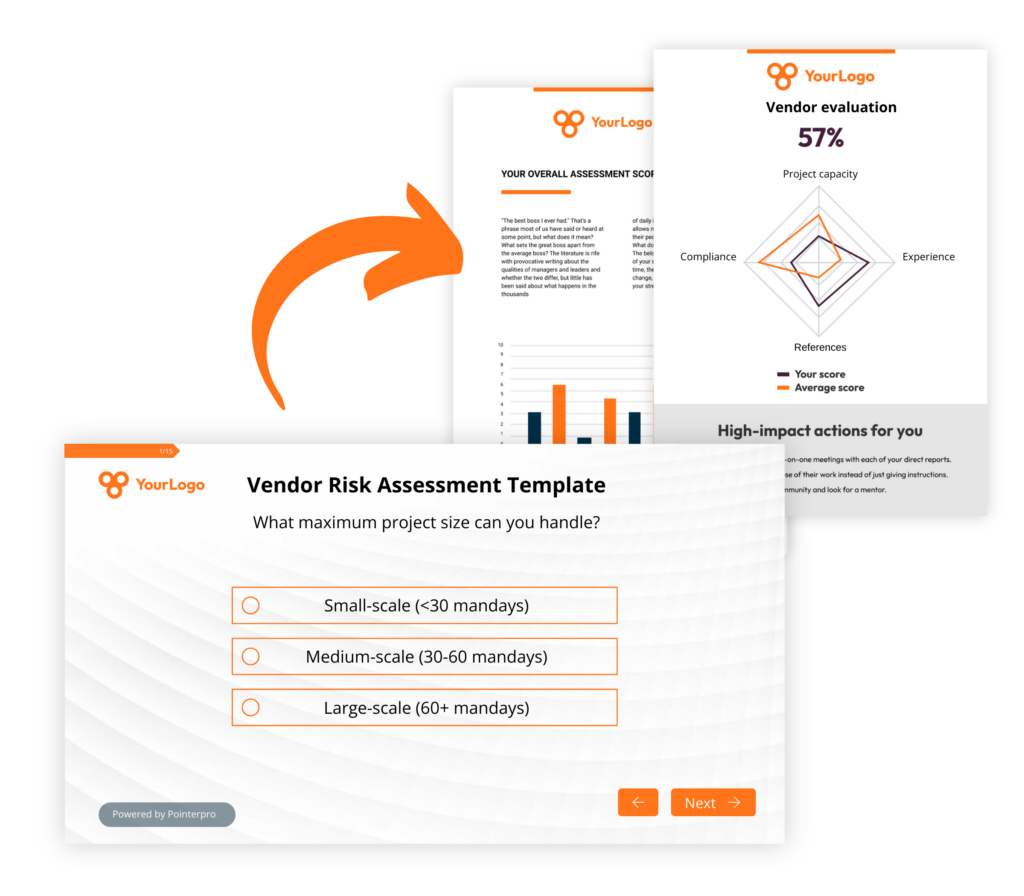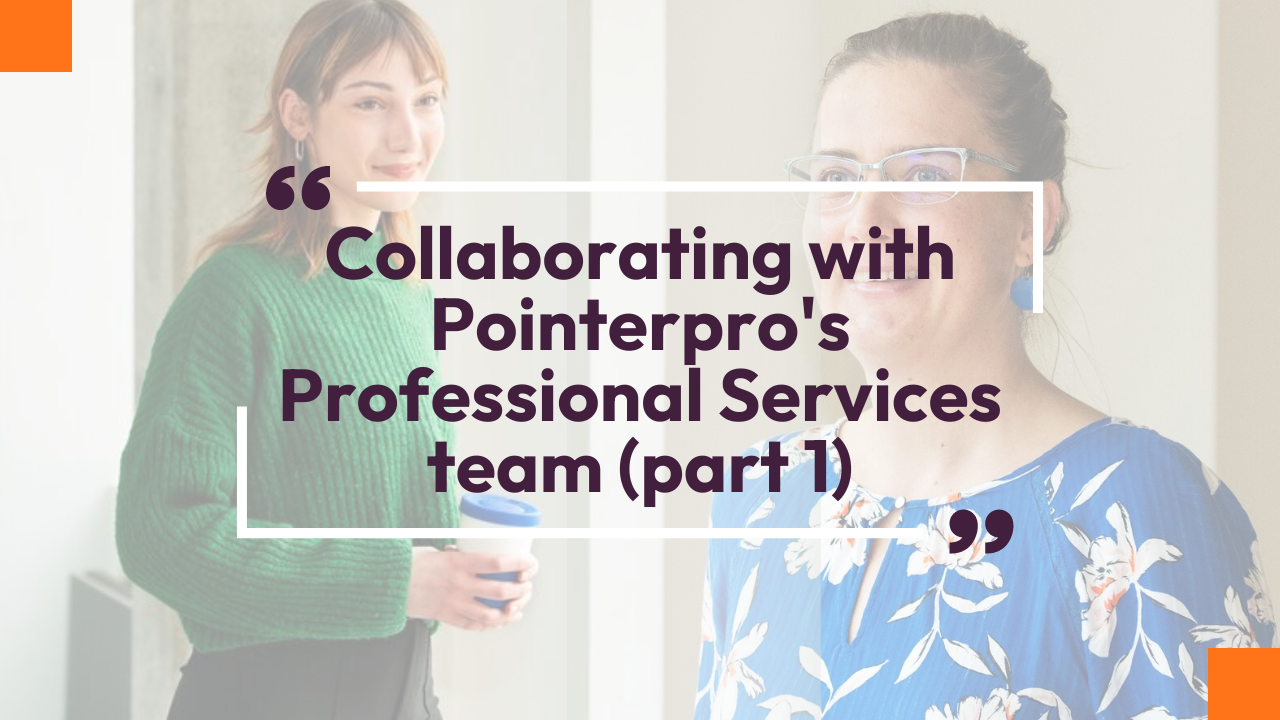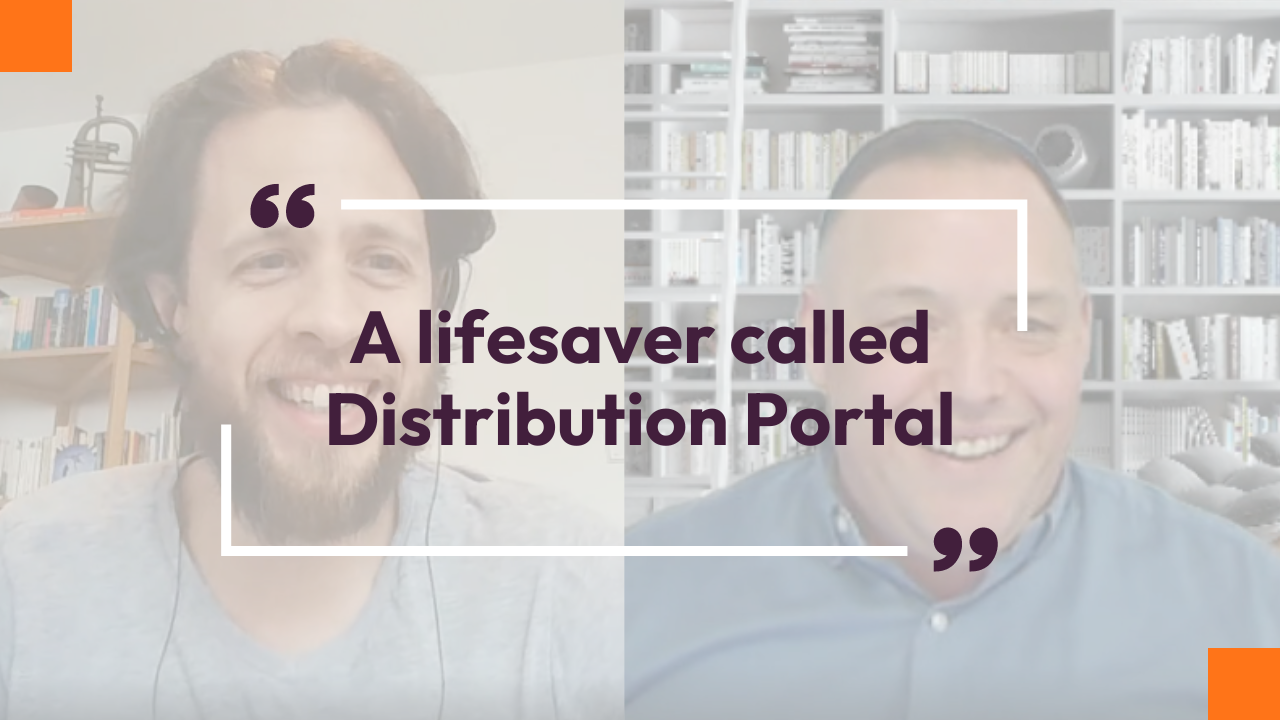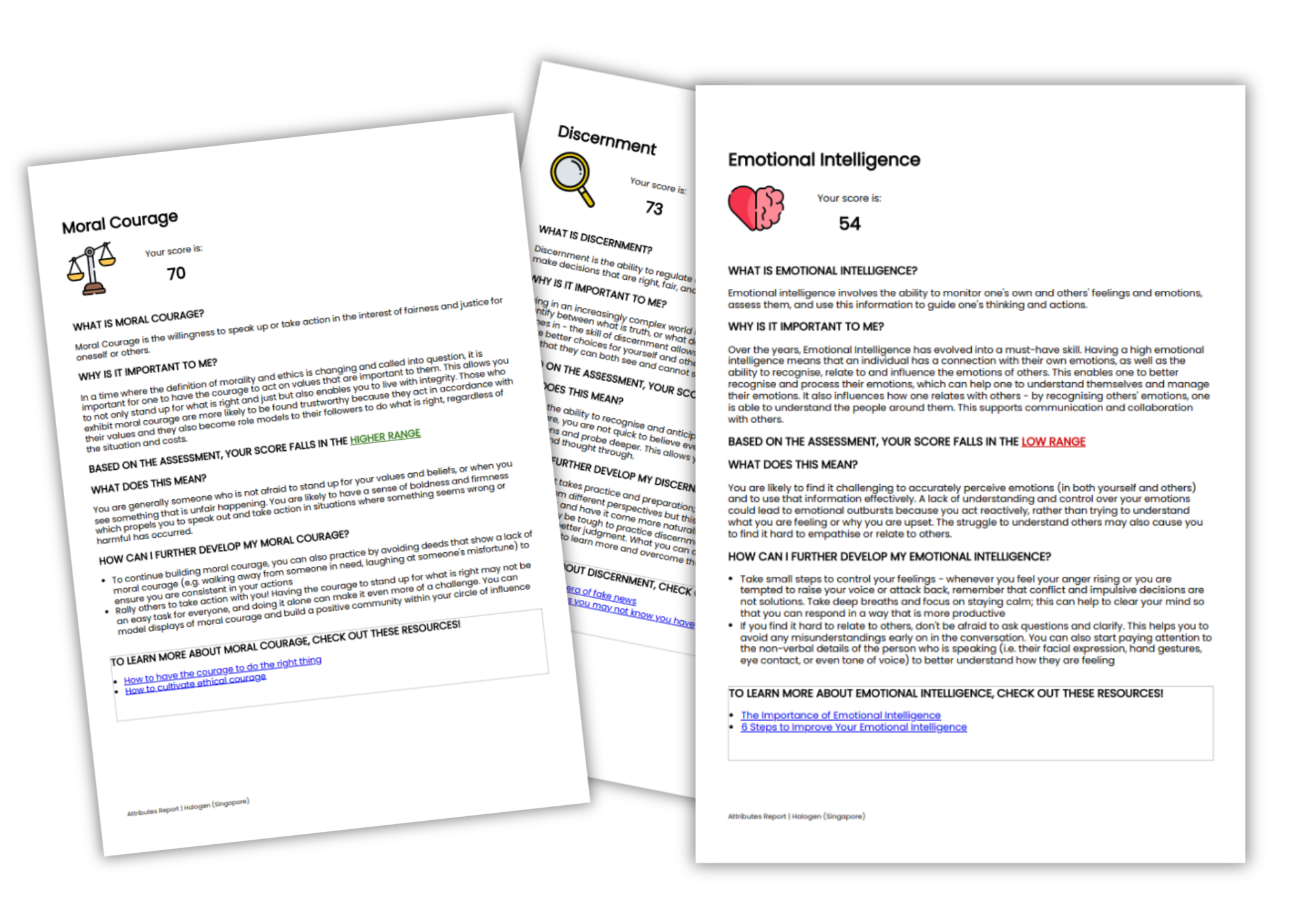Vendor risk assessment template
What if you could build a risk assessment tool to assess vendors and advise decision-makers, accurately and objectively?
It’s the first step to preventing disruption and making the right investments for your business.
Pointerpro is the 2-in-1 software that combines assessment building with personalized PDF report generation.

What is a vendor risk assessment?
A vendor risk assessment is a tool used by businesses’ procurement departments to evaluate and manage the potential risks associated with a third-party vendor or supplier. This type of assessment is crucial in today’s business environment where outsourcing and relying on external entities for critical services and products is common. The primary goal of a vendor risk assessment is to identify, analyze, and mitigate the risks that a vendor might pose to the business. The higher the investment, the more crucial informed decision-making gets. Therefore, a vendor risk assessment should provide stakeholders with objective advice reports.
3 reasons to use Pointerpro as a vendor risk
assessment tool
3 reasons to use Pointerpro as a vendor risk assessment tool
Interactive user experience
With the Questionnaire Builder you get to create an engaging assessment. How? With numerous design and layout options, useful widgets and countless question types.
Refined, score-based analysis
Our custom scoring engine helps you categorize vendors and attribute risk levels. The result? An objective and nuanced assessment of your respondents’ options.
Automated feedback in PDF
Thanks to your setup in the Report Builder, respondents instantly get a detailed PDF report: with helpful charts, a personalized risk analysis, and actionable tips.
1.500+ businesses worldwide build assessments with Pointerpro









8 key evaluation criteria for a vendor risk assessment template
The criteria to focus on in a vendor risk assessment strongly depend on the organization and the industry. Nonetheless, here are a few common criteria that could be part of an overarching vendor risk assessment template:
- Specialized knowledge, expertise, or experience: This criterion assesses the vendor's level of specialization and expertise in their field. It involves evaluating their track record, experience in handling similar projects or services, and their expertise in specific areas relevant to your needs. This ensures that the vendor has the necessary skills and knowledge to deliver quality results.
- Capability and capacity to fulfill business needs: This focuses on the vendor's ability to meet your specific business requirements. It includes assessing their resources, workforce, and infrastructure to ensure they can handle the scale of your project or service needs without compromising quality or efficiency.
- Product cost and recurring fees: This involves analyzing the overall cost-effectiveness of the vendor's product or service. It includes the initial costs, any recurring fees, and the long-term financial implications of choosing this vendor. The goal is to ensure that the vendor offers a fair price while aligning with your budget constraints.
- Availability and timelines: This criterion evaluates the vendor's ability to deliver within your required timeframe. It includes their availability to start the project and their track record in meeting deadlines. This is crucial to ensure that your own timelines and project milestones can be met.
- Technical expertise and approach: This assesses the vendor's technical capabilities and their approach to implementing technology solutions. It's about understanding how their technology aligns with your requirements and how they plan to address any technical challenges that may arise during the project.
- Security and compliance: This criterion evaluates how well the vendor adheres to relevant security standards and regulatory compliance requirements. It involves assessing their data protection measures, cybersecurity policies, incident response protocols, and compliance with laws and industry regulations (like GDPR for data privacy, HIPAA for healthcare, etc.). The focus is on ensuring the vendor can protect sensitive information and operate within legal and regulatory frameworks, thereby mitigating risks related to data breaches, legal penalties, and reputational damage. This is especially critical for vendors handling confidential, financial, or personal data.
- Vendor support options: This involves evaluating the level and quality of support the vendor offers. It includes their responsiveness to inquiries, availability of technical support, maintenance services, and how they handle issues or emergencies. Good vendor support is essential for the smooth operation and maintenance of the service or product.
- Proposed approach and work plan: This criterion examines the vendor's proposed strategy and plan for executing the project or service. It involves assessing how well they understand your needs, their methodology, project management practices, and their ability to deliver the project effectively and efficiently. This helps in determining their competence in managing and executing the project.
A generalized vendor risk assessment could focus on all these areas. To delve deeper into criteria that are especially crucial to your organization, we’d recommend developing additional vendor risk assessments with more targeted questions.
30 vendor risk assessment example questions
Here are 30 of the most common vendor risk assessment example questions divided into 3 categories:
- 10 vendor risk assessment (VRA) example questions for procurement
- 10 vendor data and security risk assessment example questions
- 10 vendor financial risk assessment example questions
10 vendor risk assessment (VRA) questions for procurement
- How many years of experience does your company have in this industry?
- What is the maximum project size your company can handle?
- What is your pricing structure for the services/products offered?
- What is your average turnaround time for delivering a project of our scale?
- Which of the following best describes your approach to technology and innovation in projects?
- What types of support do you offer post-implementation?
- How do you typically structure the work plan for a new project?
- Are you compliant with international data security standards (e.g., GDPR, ISO 27001)?
- What is your company's financial rating from independent evaluators (if applicable)?
- Can you provide references or testimonials from previous clients?
10 vendor data and security risk assessment example questions
- What data encryption standards do you employ for data at rest and in transit?
- Do you have a documented cybersecurity policy in place?
- How frequently do you conduct security audits and penetration testing?
- Are you compliant with industry-specific regulations (e.g., HIPAA, GDPR)?
- Describe your incident response plan in the event of a data breach.
- Do you provide security awareness and training programs for your employees?
- How do you manage and monitor third-party access to your systems and data?
- What physical security measures are in place at your data centers and offices?
- How do you ensure continuous security during software updates or system changes?
- Can you provide details of your most recent security audit or compliance certification?
This approach for a vendor data and security risk assessment template is focused on evaluating the vendor’s practices and policies related to data protection and cybersecurity. It aims to understand the vendor’s commitment to maintaining data confidentiality, integrity, and availability. The assessment includes questions about their adherence to legal and regulatory requirements, the effectiveness of their security measures, and their preparedness for potential security incidents. This comprehensive evaluation helps in identifying and mitigating risks associated with data handling and security breaches.
10 vendor financial risk assessment example questions
- What is your company's current credit rating?
- Can you provide your most recent audited financial statements?
- How do you manage financial risks in your operations?
- What is your company's debt-to-equity ratio?
- Have you ever faced bankruptcy or financial restructuring?
- What is your average revenue growth rate over the past three years?
- Do you have liability insurance and what is its coverage?
- How do you ensure financial stability in times of economic downturn?
- What is your policy regarding late payments and collections?
- Can you provide references from banks or financial institutions?
These vendor financial risk assessment questions evaluate the financial stability and health of the vendor. They aim to assess the vendor’s ability to sustain operations and fulfill commitments, especially in long-term engagements. The list includes questions about their creditworthiness, financial performance, risk management strategies, and insurance coverage. This examination helps in determining the financial risks associated with the vendor, ensuring they are capable of maintaining a stable business relationship.
What Pointerpro clients are saying




What should be included in a vendor risk assessment report?
A vendor risk assessment report is a comprehensive document that presents the findings of the vendor risk assessment process. The content of the report should be thorough and structured to provide clear insights into the risks associated with a particular vendor. Another important element to consider is visual aids. Illustrating and emphasizing important findings with charts makes your report easier to read and interpret for stakeholders.
Overall, here’s what should typically be included in a vendor risk assessment report template:
- Executive summary: This introductory section provides a high-level overview of the assessment's findings, highlighting key risks and recommendations. It allows decision-makers to quickly understand the major points without delving into the technical details.
- Vendor information: Basic information about the vendor, including their name, services or products offered, industry, and the nature of their relationship with your organization.
- Assessment methodology: A description of the methods and criteria used in the assessment, including the type of data collected, the sources of information, and the risk evaluation criteria.
- Risk analysis: Detailed findings of the risk assessment, categorized by different risk types such as strategic, operational, financial, security and compliance, and reputational risks. Each risk category should include the specific risks identified, an evaluation of the potential impact and likelihood of each risk and any existing mitigating factors or controls the vendor has in place.
- Vendor performance analysis: If applicable, include an analysis of the vendor's past performance, compliance history, and any relevant incidents or issues that have occurred.
- Risk scoring and prioritization: A summary of the risk scoring, typically based on the impact and likelihood of each identified risk. This helps in prioritizing which risks need immediate attention.
- Recommendations and action plan: Based on the risks identified, provide recommendations for risk mitigation. This might include suggestions for additional controls, changes in the vendor relationship, or even vendor replacement.
- Conclusion: A final summary that encapsulates the overall risk posture of the vendor and the next steps.
- Appendices: Include any detailed tables, questionnaires, or additional data used in the assessment for reference.
This report serves as a crucial tool for decision-making regarding vendor relationships and should be structured to provide clear, actionable insights.
4 more risk domains to consider for a vendor risk assessment template
Beyond the types of vendor risk assessments we’ve already covered with example questions, here are a few other very common types that may be helpful for your organization or a business you’re consulting for:
- Strategic vendor risk assessment template:
- Objective: The strategic vendor risk assessment is aimed at evaluating how well a vendor's partnership aligns with and supports the company's long-term strategic goals. It focuses on the potential impact of the vendor relationship on the company's strategic direction.
- Components: This assessment includes an evaluation of how the vendor's services or products fit with the company's long-term goals and strategies, an analysis of the vendor's market position, industry reputation, and stability, and an assessment of the vendor's capability to provide innovative solutions that can contribute to strategic objectives.
- Operational vendor risk assessment template:
- Objective: The operational vendor risk assessment aims to evaluate the efficiency and effectiveness of a vendor's operations in relation to your business processes. It focuses on the day-to-day operational risks that a vendor might pose.
- Components: This assessment includes an evaluation of how the vendor's services or products fit with the company's long-term goals and strategies, an analysis of the vendor's market position, industry reputation, and stability, and an assessment of the vendor's capability to provide innovative solutions that can contribute to strategic objectives.
- Business continuity vendor risk assessment template:
- Objective: The objective here is to assess a vendor's ability to continue delivering critical services or products in the event of a disruption. It's focused on understanding the vendor's preparedness for and resilience against various business continuity challenges.
- Components: Key components include evaluating the vendor's business continuity and disaster recovery plans, their ability to maintain operations during various types of disruptions (like natural disasters, cyber-attacks, etc.), and their track record in managing past incidents.
- Reputation vendor risk assessment template:
- Objective: This assessment is focused on evaluating the potential impact of a vendor's reputation on your business. It aims to identify risks associated with the vendor's public image and brand perception.
- Components: It involves an analysis of the vendor's reputation in the market, their history of legal or regulatory issues, public relations practices, and any potential for negative media exposure. This assessment helps in understanding how the vendor's reputation could reflect on or affect your business.
In summary, self-evaluation is a fundamental process that empowers individuals to gain self-awareness, set goals, improve their performance, make informed decisions, and lead more fulfilling lives. It is a valuable tool for personal and professional development, fostering growth and adaptability.
Create your first vendor risk assessment today
You may also be interested in
Recommended reading

Vlerick Business School digitalizes entrepreneurship development with Pointerpro [case study]
What do a top-tier international business school based in the capital of Europe and Pointerpro have in common? At the

Attain Global: How to do psychometric tests right and build a cutting-edge international business [case study]
In many countries worldwide, the pursuit of skillful and engaged employees is not so much a war on talent as

How youth development specialist Halogen reaches thousands of young Singaporeans with Pointerpro [case study]
Singapore, in Southeast Asia, is a global, economic powerhouse with a population of a little less than 6 million people.


